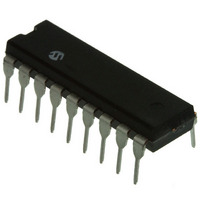PIC16F88-I/P Microchip Technology, PIC16F88-I/P Datasheet - Page 135

PIC16F88-I/P
Manufacturer Part Number
PIC16F88-I/P
Description
IC MCU FLASH 4KX14 EEPROM 18DIP
Manufacturer
Microchip Technology
Series
PIC® 16Fr
Datasheets
1.PIC16F616T-ISL.pdf
(8 pages)
2.PIC16F688T-ISL.pdf
(688 pages)
3.PIC16F818-ISO.pdf
(6 pages)
4.PIC16F87-IP.pdf
(228 pages)
5.PIC16F87-IP.pdf
(8 pages)
6.PIC16F87-IP.pdf
(4 pages)
7.PIC16F87-IP.pdf
(8 pages)
8.PIC16F88-ISO.pdf
(214 pages)
Specifications of PIC16F88-I/P
Program Memory Type
FLASH
Program Memory Size
7KB (4K x 14)
Package / Case
18-DIP (0.300", 7.62mm)
Core Processor
PIC
Core Size
8-Bit
Speed
20MHz
Connectivity
I²C, SPI, UART/USART
Peripherals
Brown-out Detect/Reset, POR, PWM, WDT
Number Of I /o
16
Eeprom Size
256 x 8
Ram Size
368 x 8
Voltage - Supply (vcc/vdd)
4 V ~ 5.5 V
Data Converters
A/D 7x10b
Oscillator Type
Internal
Operating Temperature
-40°C ~ 85°C
Processor Series
PIC16F
Core
PIC
Data Bus Width
8 bit
Data Ram Size
368 B
Interface Type
SSP/USART
Maximum Clock Frequency
20 MHz
Number Of Programmable I/os
16
Number Of Timers
3
Operating Supply Voltage
2 V to 5.5 V
Maximum Operating Temperature
+ 85 C
Mounting Style
Through Hole
3rd Party Development Tools
52715-96, 52716-328, 52717-734
Development Tools By Supplier
PG164130, DV164035, DV244005, DV164005, PG164120, ICE2000, DM163014
Minimum Operating Temperature
- 40 C
On-chip Adc
7-ch x 10-bit
Lead Free Status / RoHS Status
Lead free / RoHS Compliant
For Use With
ACICE0202 - ADAPTER MPLABICE 18P 300 MILAC164010 - MODULE SKT PROMATEII DIP/SOIC
Lead Free Status / Rohs Status
Lead free / RoHS Compliant
Available stocks
Company
Part Number
Manufacturer
Quantity
Price
Company:
Part Number:
PIC16F88-I/P
Manufacturer:
Microchi
Quantity:
6 825
Part Number:
PIC16F88-I/P
Manufacturer:
MICROCH
Quantity:
20 000
15.3
PIC16F87/88 devices have a noise filter in the MCLR
Reset path. The filter will detect and ignore small
pulses.
It should be noted that a WDT Reset does not drive
MCLR pin low.
The behavior of the ESD protection on the MCLR pin
has been altered from previous devices of this family.
Voltages applied to the pin, that exceed its specifica-
tion, can result in both MCLR and excessive current
beyond the device specification during the ESD event.
The circuit, as shown in Figure 15-2, is suggested.
The RA5/MCLR pin can be configured for MCLR
(default), or as an I/O pin (RA5). This is configured
through the MCLRE bit in Configuration Word 1.
FIGURE 15-2:
15.4
A Power-on Reset pulse is generated on-chip when
V
advantage of the POR, tie the MCLR pin to V
described in Section 15.3 “MCLR”. A maximum rise
time for V
Characteristics” for details.
2003 Microchip Technology Inc.
DD
Note:
Note 1: External Power-on Reset circuit is required
rise is detected (in the range of 1.2V-1.7V). To take
MCLR
2: R < 40 k is recommended to make sure that
3: R1 = 1 k to 10 k will limit any current flow-
Power-on Reset (POR)
DD
For this reason, Microchip recommends
that the MCLR pin no longer be tied
directly to V
only if the V
The diode D helps discharge the capacitor
quickly when V
the voltage drop across R does not violate
the device’s electrical specification.
ing into MCLR from external capacitor C
(0.1 F), in the event of MCLR/V
down due to Electrostatic Discharge (ESD) or
Electrical Overstress (EOS).
D
is specified. See Section 18.0 “Electrical
V
DD
R
C
EXTERNAL POWER-ON
RESET CIRCUIT (FOR
SLOW V
DD
DD
DD
.
power-up slope is too slow.
R1
powers down.
DD
PIC16F87/88
MCLR
POWER-UP)
PP
pin break-
DD
, as
Preliminary
When the device starts normal operation (exits the
RESET condition), device operating parameters (volt-
age, frequency, temperature,...) must be met to ensure
operation. If these conditions are not met, the device
must be held in RESET until the operating conditions
are met. For more information, see Application Note,
AN607 “Power-up Trouble Shooting” (DS00607).
15.5
The Power-up Timer (PWRT) of the PIC16F87/88 is a
counter that uses the INTRC oscillator as the clock
input. This yields a count of 72 ms. While the PWRT is
counting, the device is held in RESET.
The power-up time delay depends on the INTRC, and
will vary from chip-to-chip due to temperature and
process variation. See DC parameter #33 for details.
The PWRT is enabled by clearing configuration bit
PWRTEN.
15.6
The Oscillator Start-up Timer (OST) provides 1024
oscillator cycles (from OSC1 input) delay after the
PWRT delay is over (if enabled). This helps to ensure
that the crystal oscillator or resonator has started and
stabilized.
The OST time-out is invoked only for XT, LP and HS
modes and only on Power-on Reset, or wake-up from
SLEEP.
15.7
The configuration bit, BOREN, can enable or disable
the Brown-out Reset circuit. If V
(parameter D005, about 4V) for longer than T
(parameter #35, about 100 s), the brown-out situation
will reset the device. If V
than T
Once the brown-out occurs, the device will remain in
Brown-out Reset until V
Power-up Timer (if enabled) will keep the device in
RESET for T
V
out Reset process will restart when V
V
PIC16 devices, the PWRT is no longer automatically
enabled when the Brown-out Reset circuit is enabled.
The PWRTEN and BOREN configuration bits are
independent of each other.
DD
BOR
should fall below V
, with the Power-up Timer Reset. Unlike previous
BOR
Power-up Timer (PWRT)
Oscillator Start-up Timer (OST)
Brown-out Reset (BOR)
, a RESET may not occur.
PWRT
(parameter #33, about 72 ms). If
PIC16F87/88
BOR
DD
DD
during T
falls below V
rises above V
DD
DS30487B-page 133
PWRT
falls below V
DD
BOR
, the Brown-
rises above
BOR
for less
. The
BOR
BOR




















